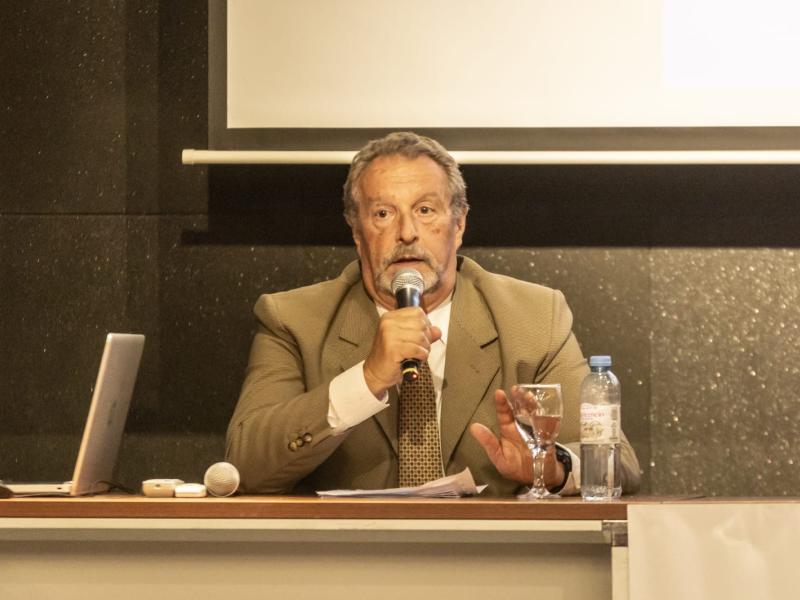Maritime teachers from across Philippines join new training programme agreed in February 2025
Mental health and wellbeing training for seafarers and cadets will be rolled out across the Philippines after a first cohort of maritime faculty members attended ‘training of the trainer’ sessions in Manila this week.
The International Transport Workers’ Federation (ITF) and the Philippine Maritime Industry Authority (MARINA) – a government agency of the Philippines – signed a partnership agreement in February this year to incorporate a new module into the curricula of Philippine maritime academies and training institutions: ‘Mental Health and Stress: Understanding Early Management and Coping’.
“It’s becoming increasingly clear that while mental health and wellbeing is a vitally important issue for seafarers, it has not been given the prominence it needs,” said Dr Conrad Oca, President of ITF affiliate, the Associated Marine Officers' and Seamen's Union of the Philippines (AMOSUP), and 1st Vice Chair of the ITF Seafarers’ Section Committee.

“Seafarers face unique mental health challenges, and with Filipinos comprising the majority of the world’s seafarers, I’m truly proud to be joining the ITF for the launch of this initiative which will ensure that our seafarers all around the world are equipped to deal with the challenges they will face at work.”
The rolling out of the new programme comes after 2025 research revealed that seafarer deaths from suicide now outnumber those from accidents.
In its June 2025 Crew Claims Report, Norwegian P&I firm Gard also found that while illness is the leading cause of death, accounting for 83% of crew fatalities registered in 2024, stress is also a key factor, with 80% of the most common illnesses among crew caused or aggravated by stress,
“Seafarers face long periods away from their families, demanding workloads, and the isolation that comes with the maritime profession - these realities can take a toll on the seafarers’ mental and emotional wellbeing,” said Executive Director of the STCW Office at MARINA, Samuel L Batalla.
“Addressing these challenges is not just a moral responsibility but also a professional necessity for a safe, resilient and thriving maritime workforce.”

He added: “MARINA is committed to supporting seafarers and their families to promote their wellbeing - this TOT program is just the beginning of that process. In coming months, we will work with the ITF to train the faculty members of all maritime institutions of the Philippines so that they start educating their cadets and students. With support from the ITF, we envision developing a comprehensive wellbeing program for Filipino seafarers.”
The ITF’s joint work with the Philippine Government mirrors similar ITF partnerships with Indonesia and India, and training undertaken in Romania for ten maritime universities from seven Black Sea countries (Albania, Bulgaria, Georgia, Montenegro, Romania, Turkey and Ukraine).
In April this year, the ITF joined India’s Directorate General of Shipping (DG Shipping) in Mumbai in an event that marked the first time in India that unions, government officials, shipping companies and seafarers’ families have convened to address mental health, suicide and seafarers' death compensation.
At the meeting, India’s DG Shipping set a new standard for the industry by committing to ensuring compensation for all seafarer deaths onboard Indian-flagged ships, including suicides, under both new and existing agreements.
ITF Maritime Coordinator, Jacqueline Smith, said: “The importance of the ITF’s work with MARINA cannot be understated – by working together to improve mental health and wellbeing, we will save Filipino seafarers’ lives.
“At the ITF, we know that there must be a fundamental culture shift in how we view and treat seafarers’ mental health in order to prevent the tragic loss of life that we’re seeing from mental ill health. And through the ITF’s leadership in training the next generation of seafarers and cadets, wherever they may be, alongside advocating for wider changes across the maritime industry, we’re determined that we will make the change that we need to see.”
END
Media contact: Rosalyn Smith, smith_rosalyn@itf.org.uk, +44 7522 229623



